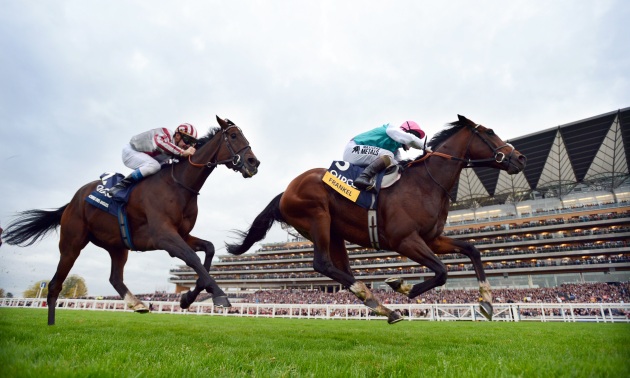It's easy to snipe and swipe at the blue punchbag that is Godolphin, a victim of its former glories, its future ambitions and its present ways, very much the Chelsea of racing's premier league. But Godolphin has its equivalent of Eden Hazard, the shining star radiating light at the end of the tunnel, the one around whom a top team can still be rebuilt, and his name is Dubawi.
Book 1 of this week's Tattersalls Yearling Sale is proof of the power of Dubawi. Four of the top six lots over the first two days were by Dubawi, commanding a combined total of almost 7 million guineas, and all bar one of them was bought by Godolphin, desperate to wrap up him and his progeny in the royal blue banner as much as possible, to go with their stream of homebreds.
Wuheida winning the Group 1 Prix Marcel Boussac on Arc day was significant as the final precocious piece in the jeweled jigsaw for Dubawi, providing a hitherto hidden two-year-old gem, and it could be the dusty London buses line with Sobetsu in the Fillies' Mile, because she won her maiden pulling a London bus.
The rapid rise of Daddy Dubawi is part of the reason Godolphin largely sat out the early sales exchanges when it came to the Frankel foals; that and the fester-fostering fact that Frankel was a Juddmonte-Coolmore creation, leaving Godolphin feeling like Friends Reunited after Facebook merged with Instagram.
But for everybody in racing - with the possible exception of Brigadier Gerard's lad - Frankel is impossible to ignore, and one of the most meaningful manouevres of the last month was when Godolphin put a load of money on a table in front of Bjorn Nielsen to tempt Atty Persse away from him following the Frankel-fuelled flyer's distinguished debut at Sandown.
The announcement that Atty Persse would remain with Roger Charlton didn't prevent references to conditions races at Nottingham next autumn, the default jibe of any and every Group-race graduate representing Godolphin, specifying - with some justification - that the young talking horses do more balking than walking come crunch time. But could we, should we, dare we start asking the same question of Frankel?
All brightness and no heat. That's the broad indictment of Godolphin, in the time of the seven lean years, exacerbated by the multi-million sums involved. Frankel, too, is a multi-million-pound business, and no first-season sire has shone as brightly as him for rates and strike-rates, but the heat is being turned up on his irreproachable progeny, and a few of them have got out of the kitchen.
Frankel's two fillies that have contested Group 1s didn't cut it, Queen Kindly a let-down but Toulifaut virtually brought down, and neither defeat in any way diminishes from their sire or their previous prodigious progress. But when the flatlining of some others is taken into account, sudden for Fair Eva and gradual for Cunco and Majoris, and it's put into the context of the pressures involved in training a Frankel, in getting them off the ground quickly and successfully, the skyline changes ever so slightly, its shooting stars seeming marginally more dim and distant.
Gracing the stage as he did, with the grace he had, gives him an extended grace period as a stallion, because it's his first season, because of his outrageous start, and because he's Frankel. As you may be aware, I come from this as Frankel's biggest fan, and this isn't by any means doom-mongering nor naysaying, it's simply a reality check, and a reality checklist for the Frankel high-rollers to come, starting on Saturday.
This was the point in proceedings I intended to introduce Aljezeera and Swiss Storm, two fearsome Frankels who were due to sit critical exams this weekend, entered in the Fillies' Mile and Autumn Stakes respectively, but neither was declared, though there is still a big one in a big one.
Of all the Frankels we've seen, perhaps the most like him in style and spirit is Seven Heavens. That stride at Ascot and that fervour at Goodwood were as much of an identification of a father's son as any DNA test. Frankel was all about raw power, and Seven Heavens has looked both very raw and very powerful in two unbeaten runs, the type who could take off, literally and figuratively.
It's unreasonable to expect him to beat Churchill in the Dewhurst, the pair chalk and cheese for where they're at in their development, one buffed by five races into a polished diamond, the other still uncut, but the race was the point at which Frankel went from boy to man, and the same could easily happen to Seven Heavens.
What we see depends mainly on what we look for. We're seeing the best in the Frankel progeny, because we look back on him with such astonishment and admiration, for what he was and what he gave us. But if the horse from the Gods is to become the stallion from the Heavens, then Seven Heavens for one will have to really get the paternal party started.
Follow the results and look up future entries of Frankel's progeny for free






















.jpg)


 Url copied to clipboard.
Url copied to clipboard.


.jpg&w=300)



.jpg&w=300)

































